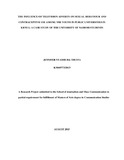| dc.description.abstract | This study sought to examine the influence of television adverts on contraceptive use among the
youth in public universities in Kenya. More specifically, the study sought to achieve the
following specific objectives; to examine the extent to which TV adverts influence sexual
behavior of the youth in public universities, to establish whether TV adverts influence on the use
of contraceptives by the youth in public universities, and to determine the influence of
contraceptive adverts on sexual behavior of the youth in public universities. Participants
comprised of undergraduate students who were from The University of Nairobi School of
Journalism and Mass communication. The target population in this study was 1200 youth in
their productive ages (16 - 24 years). Simple random sampling was used to determine the sample
size of 291 respondents. Purposive sampling technique was also used to sample the focus group
discussion. The study was guided by social learning theory and cultivation theory. The study
used a mixed method design. The quantitative data was analyzed using descriptive statistics and
results presented in form of tables, charts, graphs, and narratives. Statistical package for social
science (SPSS) was used to aid in analyzing the quantitative data. The qualitative data derived
from interviews was analyzed thematically. The different responses were analyzed in relation to
the research objectives and trends were established. The findings of the study with regard to
those objectives shows that majority of the respondents are actively involved in sexual activity.
The study findings also indicated that most of the respondents strongly agreed that television
adverts influenced their sexual behavior and attitude towards sex. This was also indicated during
the focus group discussion where participants indicated that as much as TV adverts influenced
them to use contraceptives, peer pressure was the major influence towards sexual activity in the
university. The study concluded that Television adverts do have an impact on sexual behavior
and contraceptive use among the youth in public universities. TV adverts also alter the sexual
behavior of most youth by predicting and/or hastening adolescent sexual initiation. Reducing the
amount of sexual content in entertainment programming, reducing adolescent exposure to this
content, and/or increasing references to and depictions of possible negative consequences of
sexual activity could appreciably delay the initiation of early sex debut. The study recommends
that more television adverts/campaigns on contraceptives should be developed to enlighten the
youth on risky sexual behaviors such as masturbation, petting behavior, oral sex, anal sex and
sex with multiple partners while condom advertising can be effective in increasing condom use
among the youth. The youth should have more exposure to mass media campaigns on safe sex
and use of contraceptives to ensure reduced incidences of early pregnancy, STIs and HIV/AIDS.
The study recommends that further research should be carried out to establish whether TV adverts on contraceptives enlighten the young professionals on safe sex and HIV and AIDS
prevalence among them. | en_US |

